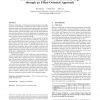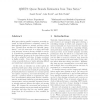870 search results - page 63 / 174 » The failure detector abstraction |
ASPLOS
2010
ACM
14 years 4 months ago
2010
ACM
Multicore technology is making concurrent programs increasingly pervasive. Unfortunately, it is difficult to deliver reliable concurrent programs, because of the huge and non-det...
JSSPP
2007
Springer
14 years 3 months ago
2007
Springer
Most space-sharing parallel computers presently operated by high-performance computing centers use batch-queuing systems to manage processor allocation. Because these machines are...
USENIX
2008
13 years 11 months ago
2008
Continuous memory leaks severely hurt program performance and software availability for garbage-collected programs. This paper presents a safe method, called LeakSurvivor, to tole...
POPL
2008
ACM
14 years 9 months ago
2008
ACM
Relevance heuristics allow us to tailor a program analysis to a particular property to be verified. This in turn makes it possible to improve the precision of the analysis where n...
ECCV
2008
Springer
14 years 11 months ago
2008
Springer
Abstract. The use of sparse invariant features to recognise classes of actions or objects has become common in the literature. However, features are often "engineered" to...


